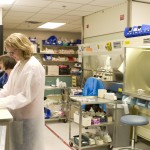Emory University researchers are taking part in a multi-site study across the United States to track the immune responses of people hospitalized with COVID-19 that will help inform how the disease progresses and potentially identify new ways to treat it. The study is funded by the National Institute of Allergy and Infectious Diseases (NIAID), part of the National Institutes of Health.
The study – called Immunophenotyping Assessment in a COVID-19 Cohort (IMPACC) – launched Friday. Investigators expect to enroll up to 2,000 individuals who have been hospitalized with the new coronavirus in 10 research locations across the country.
Participants will be followed for up to 12 months after their hospitalization to assess how well they recover and whether they develop durable immunity to the virus.
 Nadine Rouphael, associate professor at Emory’s School of Medicine, is leading the investigation as part of NIAID’s Human Immunology Project Consortium (HIPC) and says the study aims to determine how certain immunological measures correspond to or even predict the clinical severity of COVID-19.
Nadine Rouphael, associate professor at Emory’s School of Medicine, is leading the investigation as part of NIAID’s Human Immunology Project Consortium (HIPC) and says the study aims to determine how certain immunological measures correspond to or even predict the clinical severity of COVID-19.
“The IMPACC study is a unique opportunity to leverage clinical data and samples with cutting edge technology,” Rouphael says. “By analyzing the immune responses of diverse participants enrolled in the study, we aim to better understand why some cases of COVID-19 worsen while other patients recover.”
As participants recover, investigators will continue evaluating their immune responses to see how they fare: Do they experience lingering symptoms, or do they get long-term protection against the virus? This effort is one of many clinical projects working to better understand how this novel disease affects people differently and determine optimal ways to treat COVID-19.
Researchers will recruit participants within 36 hours of their admission to the hospital and collect blood and nasal swabs throughout their hospitalization, and during follow-up clinic visits after discharge. When possible, researchers will also examine lower airway secretions collected from patients requiring a ventilator for breathing support. Participants can be co-enrolled in other studies, such as those evaluating experimental treatments for COVID-19.
Biologic samples from all study participants will be sent to a number of Core Laboratories for detailed analysis of various aspects of the immune response to the virus that causes COVID-19.
For more information on the U.S. government response to the COVID-19 pandemic, visit www.coronavirus.gov.






 The
The 